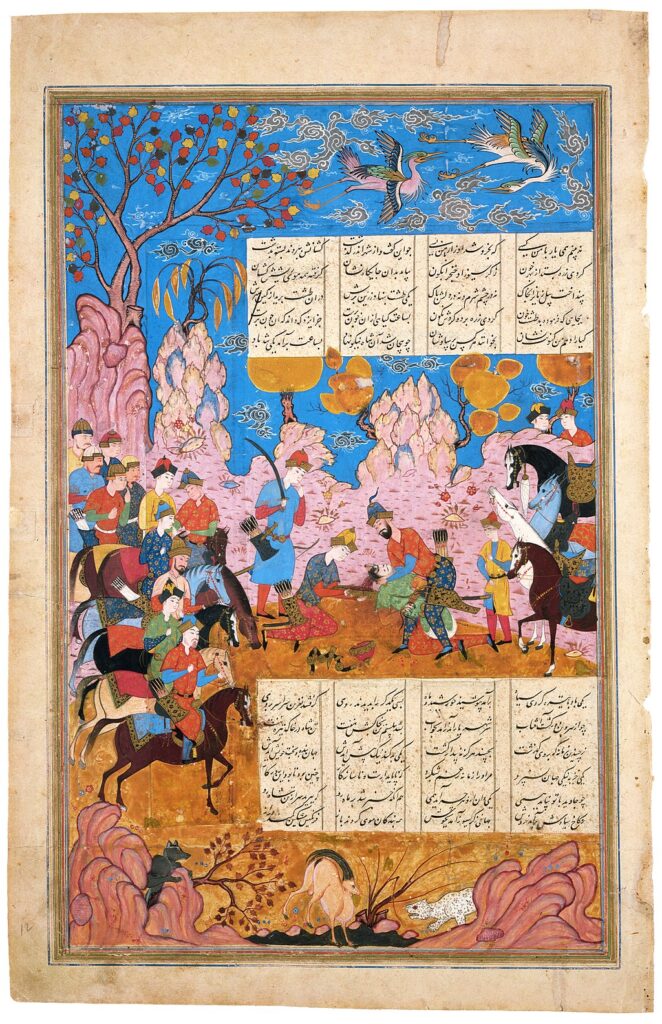|
Getting your Trinity Audio player ready...
|
In the tapestry of Persian mythology, few stories are as hauntingly beautiful as that of Siavash. A figure of purity, courage, and tragic sacrifice, Siavash is more than just a character in Ferdowsi’s Shahnameh—he’s a reflection of timeless ideals and a reminder of the cost of staying true to oneself.
As I delved deeper into his story, I found myself drawn not just to the details of his life, but to the broader lessons his journey offers. Siavash isn’t just a Persian hero; he’s a universal archetype, one that speaks to anyone who has struggled to uphold their values in a world that often seems to reward the opposite.
The Making of a Hero
Siavash’s story begins with promise. Born to King Kai Kavoos, he’s sent away to be raised by Rostam, the legendary warrior. This decision, to have him nurtured away from the palace, shields him from the corrupting influences of courtly life. It’s in the wilderness that Siavash’s character is forged—his strength honed, his mind sharpened, and his sense of justice deeply ingrained.
From the start, he’s a hero in the making. But what sets him apart isn’t just his skill in battle; it’s his moral compass. Siavash stands for something larger than himself, a quality that becomes both his greatest strength and his ultimate undoing.
Through the Fire
The trial by fire is the moment that transforms Siavash from a prince to a legend. Accused of dishonor by the jealous Queen Sudabeh, he chooses to prove his innocence in the most dramatic way possible: by walking through a blazing fire.
Emerging unscathed, he becomes a living embodiment of purity and truth. In a world that often doubts the incorruptible, Siavash’s act is a reminder that integrity has its own power.
This scene always strikes me as deeply modern. How often are we forced to prove our worth in the face of unwarranted doubt? Siavash’s fire isn’t just a physical test; it’s a metaphor for every time we’ve been asked to defend our character.
Siavashgerd: A Vision of Utopia
When politics force Siavash into exile, he doesn’t descend into bitterness. Instead, he builds. In the land of Turan, he marries Farangis, the daughter of King Afrasiyab, and creates Siavashgerd, a city of peace and justice.
This is the Siavash I admire most—not the warrior or the martyr, but the dreamer. Siavashgerd is more than a city; it’s a vision of what society could be if we placed integrity and harmony above power and greed. It’s the kind of vision we desperately need today, where innovation and compassion seem to be at odds.
The Fall
But, of course, this is a tragedy. Despite his efforts to build bridges between Iran and Turan, Siavash is betrayed and executed by Afrasiyab. His death sends shockwaves through the epic, setting the stage for his son, Kay Khosrow, to rise and avenge him.
I think about Siavash’s sacrifice often. His life reminds me that staying true to our values can come at a cost. Sometimes, the world doesn’t reward integrity. But even in death, Siavash’s legacy is one of hope. His ideals inspire those who follow him, proving that while the body can be destroyed, the spirit of justice endures.
Why Siavash Still Matters
Siavash’s story is more than a relic of Persian mythology; it’s a blueprint for living. He shows us the power of resilience, the importance of staying true to our values, and the potential of vision in the face of betrayal.
As I write this, I can’t help but think about the modern parallels. In a world where cynicism often feels like the default setting, we need stories like Siavash’s. We need reminders that purity, courage, and sacrifice are not outdated ideals—they’re the foundation of any meaningful life.
Siavash didn’t live for himself. He lived for an idea. And even though that idea cost him everything, it outlived him. Maybe that’s the point.
Sources and Inspirations
- Ferdowsi, Abolqasem. Shahnameh – Translated by Helen Zimmern(Shahnameh (1)).
- Warner, Arthur George, and Edmond Warner. The Shahnama of Firdausi(shahnama01firduoft).
- “Analysis of Siavash’s Narrative and its Archetypes” – Persian Textual Studies.
- Comparative Studies on Siavash, Fereydoun, and Keykhosrow.
- Personal reflections inspired by Persian mythology and the Shahnameh.
If you’ve ever felt the weight of staying true to your values, Siavash’s story will resonate with you. He’s not just a hero; he’s a mirror, reflecting the best—and the hardest—parts of ourselves.
Would love to hear your thoughts. Do you see pieces of Siavash in your own life? Share in the comments, or let’s chat.

